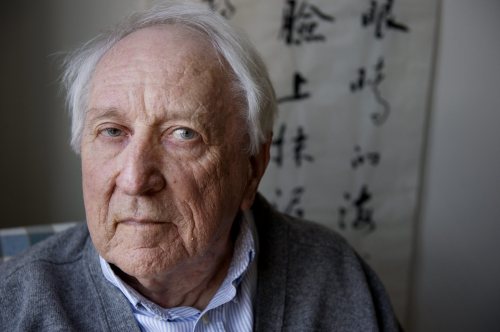
A trained psychologist, Transtroemer suggests that the poetic examination of nature offers insights into human identity and its spiritual dimension, which often enters metaphysical territory.
“A human being’s existence does not end where the fingers end,” one Swedish critic said of Transtroemer’s poems, which have been described as “secular prayers.”
Transtroemer’s reputation in the English-speaking world owes much to his friendship with American poet Robert Bly, who has translated much of the Swede’s work into English, one of 50 languages in which his poems have appeared.
His poems are rich in metaphors and imagery, painting simple pictures from everyday life and nature.
His introspective style, described by Publishers Weekly as “mystical, versatile and sad”, is in contrast with Transtroemer’s life, which shows a constant, active commitment to working for a better world ― and not just by writing poems.
Born on April 15, 1931 in Stockholm, Transtroemer was raised alone by his mother after his father left them. He graduated in psychology in 1956 and started working in an institution for juvenile offenders in 1960.
In his parallel careers as psychologist and poet, he also worked with the disabled, convicts and drug addicts while, at the same time, producing a large body of poetic work.
When he was 23 and still a psychology student, Transtroemer’s first collection of poetry, “Seventeen poems” was published by Bonnier, northern Europe’s most prestigious publishing house.
Bonnier has described Transtroemer’s poetry as “a permanent analysis of the enigma of the individual identity faced with the labyrinthian diversity of the world”.
In 1966, he received the Bellman prize, which was followed by a plethora of other awards, including the Bonner award for poetry, Germany’s Petrarch prize and the Swedish Academy’s Nordic prize.
In 1997, the working-class city of Vaesteraas, where the poet lived for three decades before moving back to the capital Stockholm in the 1990s, established a special Transtroemer prize.
After publishing 10 volumes of poetry, Transtroemer suffered a stroke in 1990 which affected his ability to talk.
After a break of six years, he came back with “Grief Gondola”, a book that sold 30,000 copies in his native Sweden, a stunning figure by poetry standards.
Following this success, Transtroemer published nothing for eight years, except for his correspondence with Bly, before returning in 2004 with a collection of 45 haikus, Japanese-style poems invoking an aspect of nature or the seasons.
Since then, music has become more important to the accomplished amateur pianist than his writing, he told Swedish paper of reference Dagens Nyheter in an interview earlier this year through his wife Monica.
He plays the piano every day, using his left hand, the right damaged by the stroke, and spends his mornings listening to classical music.
Transtroemer, who had been tipped as a potential Nobel prize winner for years, lives with his wife. The couple have two daughters.
<한글기사>
노벨 문학상에 스웨덴 트란스트뢰메르
한림원 "현실에 대한 새로운 접근법"
6일 올해 노벨 문학상 수상자로 선정된 스웨덴 시인 토마스 트란스트뢰메르(80)는 우리나라에서는 다소 생소하지만 지난 1990년대 부터 노벨상 수상 후보로 끊임없이 거론돼온 스웨덴 '국민시인'이자 북유럽 대표 시 인이다.
특히 1996년 폴란드의 비슬라바 쉼보르스카 이후 시인 수상자가 배출된 적이 없 어 올해에는 어느 때보다 시인 출신 노벨 문학상 수상자 탄생 가능성이 높은 것으로 예측돼 왔다.
트란스트뢰메르는 지난 1931년 스웨덴 수도 스톡홀름에서 언론인인 아버지와 교 사인 어머니 사이에 태어났으며, 어린 시절 부모의 이혼으로 어머니 밑에서 성장했 다.
10대 시절 스웨덴의 소드라 라틴어학교에서 수학하며 시를 쓰기 시작한 그는 19 54년 23세의 나이에 시집 '17편의 시'(Seventeen Poems)를 발표하며 작가의 길로 들 어섰다.
스톡홀름 대학교에서 심리학과 문학사, 종교사 등을 공부한 그는 1956년 졸업 이후 모교 부설 연구기관 연구원과 청소년 교정시설 심리학자 등으로 일하며 본격적 인 작품 활동에 들어갔다.
북유럽 특유의 자연환경에 대한 깊은 성찰과 명상을 시로 써온 그는 1958년, 여 행을 통한 경험을 담은 '여정의 비밀'(Secrets along the way)을 출간한 것을 비롯 해 1962년 '미완의 천국'(The Half-Finished Heaven), 1966년 '창문들 그리고 돌들' (Windows and Stones)을 잇따라 펴냈고, 1974년에는 유년시절의 기억을 소재로 한 '발트해'(Baltics)를 출간했다.
1990년에는 뇌졸중으로 쓰러지면서 반신마비로 대화가 어려울 만큼 건강이 악화 됐지만 이후에도 작품활동을 계속 이어갔으며, 2004년에는 시집 '위대한 수수께끼'( The Great Enigma)를 펴냈다.
트란스트뢰메르는 50여년간 단 200여편의 시만을 발표한 것으로 알려져 있지만 그의 시는 50여개 언어로 번역됐을 만큼 세계적 명성을 누리고 있다.
특히 북미 지역에는 이미 지난 1960년대, 오랜 친구이자 시인인 미국인 로버트 블라이를 통해 소개되면서 큰 주목을 받아 왔다.
한국에서는 이번 노벨문학상 후보로 이름이 오르내린 시인 고은씨가 책임편집한 '오늘의 세계 시인' 시리즈 중 하나로, 지난 2004년 트란스트뢰메르가 직접 선정한 96편의 시를 담은 '기억이 나를 본다'가 출간된 바 있다. (연합뉴스)








![[Graphic News] More Koreans say they plan long-distance trips this year](http://res.heraldm.com/phpwas/restmb_idxmake.php?idx=644&simg=/content/image/2024/04/17/20240417050828_0.gif&u=)
![[KH Explains] Hyundai's full hybrid edge to pay off amid slow transition to pure EVs](http://res.heraldm.com/phpwas/restmb_idxmake.php?idx=644&simg=/content/image/2024/04/18/20240418050645_0.jpg&u=20240419100350)





![[From the Scene] Monks, Buddhists hail return of remains of Buddhas](http://res.heraldm.com/phpwas/restmb_idxmake.php?idx=652&simg=/content/image/2024/04/19/20240419050617_0.jpg&u=20240419175937)

![[KH Explains] Hyundai's full hybrid edge to pay off amid slow transition to pure EVs](http://res.heraldm.com/phpwas/restmb_idxmake.php?idx=652&simg=/content/image/2024/04/18/20240418050645_0.jpg&u=20240419100350)

![[Today’s K-pop] Illit drops debut single remix](http://res.heraldm.com/phpwas/restmb_idxmake.php?idx=642&simg=/content/image/2024/04/19/20240419050612_0.jpg&u=)